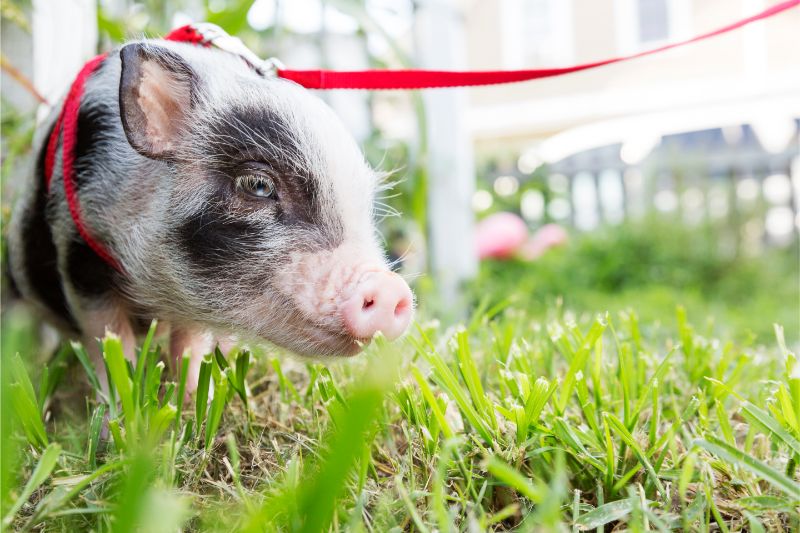
It is more and more common for us at Shiloh Veterinary Hospital to see people with pets other than dogs and cats. No matter the species, we think that your animal family members deserve the best in veterinary care.
Pot-bellied pigs as pets are an increasingly popular choice and they can make absolutely amazing additions to the crew. They aren’t for everyone, though. Before considering a pot-bellied pig as your next pet, it is important to do your research.
Learning the Basics
Before committing to a new porky addition, there are a few basic requirements that you need to be sure that you meet. Find out the following:
Am I allowed to keep a pig? — In some jurisdictions pot-bellied pigs are considered livestock. Be sure that the area you live, including your home-owners association if applicable, allow you to keep pot-bellied pigs as pets. How heartbreaking would it be to have to get rid of your pig because you didn’t research first?
Does my home provide a pig-friendly environment? — Pigs need a little space – ideally an outdoor area – to root and roll around in that is secure from predator species including dogs.
Do I have knowledgeable help with my pig? — Your pig will need veterinary care and you will likely need advice on proper care for your pet. Do you know who you will turn to? (Hint: Drs. Rosen and Anderson are happy to help you with all of your pot-bellied pig questions)
How will I transport my pig? — Pigs occasionally must be transported to the vet and other places. Do you have a vehicle large enough and appropriate for a pig passenger? Keep in mind that Shiloh Veterinary Hospital comes to you!
Consider, too, that a pot-bellied pig is a long time commitment. These adorable creatures live up to fifteen years, not reaching their mature size until between three and five years of age. It can also be difficult to know how big your pig will become as genetics can be somewhat complicated. There are no guarantees, no matter what your pig’s breeder may claim.
Caring for Pot-Bellied Pigs
Pot-bellied pigs aren’t dogs, and it is important to remember that fact. Pigs, no matter how well-trained, will always act like pigs. This means that they often strive for dominance and may have aggressive tendencies with you, other pets, or children in the home.
Pigs are also very social animals. Most do best with another piggy pal in the home, begging the question – do you have the time, space, and resources for two pigs?
Some basic care is the same from species to species, however there are some special considerations when it comes to pigs.
- Pigs need mental and physical stimulation and can be very demanding of your attention.
- Pigs can be destructive and mischievous – secure fencing is a must!
- Regular hoof and tusk trims are required.
- Pigs enjoy the outdoors and should have a yard to explore with shade and a pool to wallow in.
- Rooting is a normal piggy behavior that is adorable but may make a mess of your home, their feeding and watering area, and the yard.
- Nutrition is important due to pig’s fast growth rates. A balanced, pelleted feed should make up most of a pig’s diet with grazing intake considered in total calorie allotment.
- It is generally recommended to spay or neuter pot-bellied pigs around 3 months of age.
A Few Considerations
Having pot-bellied pigs as pets can be an incredibly worthwhile and rewarding experience. They are extremely smart and can be endearingly affectionate, these guys and gals are truly amazing animals!
Owning pigs isn’t for everyone, but there are plenty of rescues and sanctuaries in California where you can get your porcine fix if needed.
